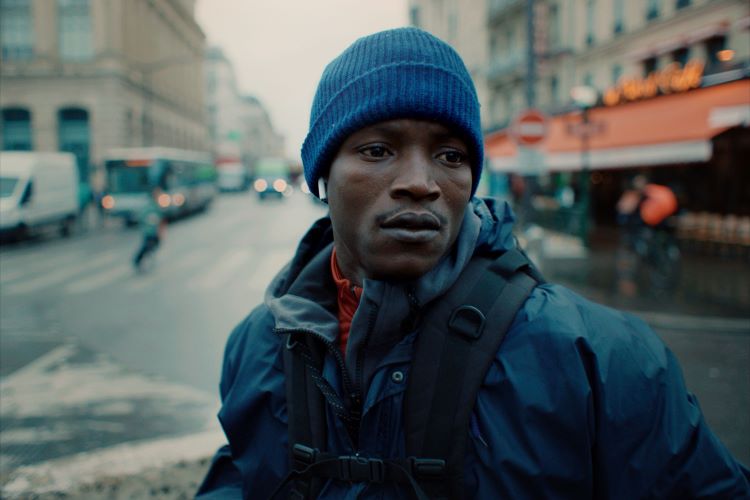
Souleymane’s Story is a moving, suspenseful, and visceral depiction of the immigrant experience, through several significant days in the life of Souleymane, as he waits and prepares for the interview with the OFPRA that will determine his future. Directed by Boris Lojkine with a script co-written with Delphine Agut, at the heart of the film is an outstanding performance by non-professional actor Abou Sangare as Souleymane, who has come to Paris from Guinea in the hope of building a better life for himself. But it all depends on whether he is granted a residence permit. For now, his existence is a harsh one, filled with uncertainty.
Souleymane cannot legally work in Paris without that coveted residence permit, but he has an arrangement with another African immigrant, Emmanuel, from whom he “rents” the use of his account on a delivery app. As Souleymane zooms through the city streets on his bike, dealing with the difficulties that come up with equanimity, he appears resilient, hard-working, and determined to succeed. Yet the exigencies of life as an immigrant are extreme, leaving the individual vulnerable and nearly without agency. Sleeping in shelters, he must register daily by a certain hour to secure a place. The same goes for catching the bus to the shelter. Once there – evening rituals are regulated by the administrators. Each person is assigned a bed, lights off at the appointed hour with not much time for showers or washing clothes in the sink. And it all starts up again the next morning, as Souleymane takes to his bike to begin a day of deliveries, often at the whim of restaurants that are slow to hand over the order, or customers who never seem to see him or speak to him. On one of the rare occasions when someone does engage him in conversation, he teases Souleymane with an implied threat, just because he knows he can.
The film reveals a hierarchy of immigrants (referring to recent immigrants). At the top are those who have already acquired legal status, but in Souleymane’s interactions with others over the course of the film, there is insight into the nuances of hierarchy among those who are still in legal limbo. As tenuous as Souleymane’s situation may be, still waiting for his interview and working illegally using Emmanuel’s permit, he is still more fortunate than others who may not have a connection to an illegal job and no way of earning even a meager living.
Within this hierarchy of immigration are those who profit from the plight of others. Some like Emmanuel, run a small business, allowing Souleymane to use his delivery permit for an exorbitant cut of the earnings, others, like Barry, operate on a large scale, using their questionable knowledge and experience to offer their coaching services to help pass the interview to obtain legal status.
It’s chilling to realize that however difficult Souleymane’s circumstances are in Paris, he still feels that here he has more hope for the future than in the country of his birth. As he awaits his interview with the OFPRA, the government agency in charge of immigration issues, Souleymane struggles with the question of what to say. Should he tell the truth, or should he memorize the narrative that Barry insists is the only way to obtain legal status? Tristan Galand’s camerawork and Xavier Sirven’s editing give the film an edgy, visceral, sense of constant movement, reflecting Souleymane’s precarious existence. The tension mounts towards the climatic scene of the interview, with Nina Meurisse as the agent, asking the expected questions in a neutral, professional demeanor, who nonetheless seems to regard Souleymane with compassion as he tells his story.





